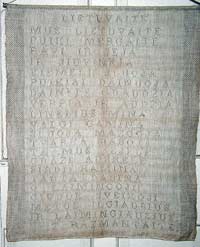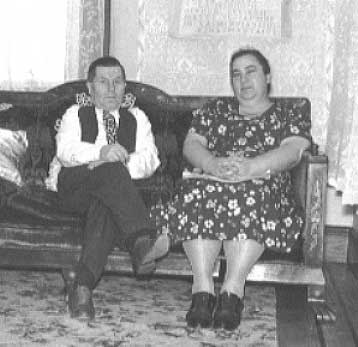A Lithuanian Tapestry
Lietuvaite
Lithuanian Girl
Mus Lietuvaite puiki mergaite.
Our Lithuanian girl, wonderful (proud) girl
Ravi ir seja ir siuvineja
You cultivate and sow and sew (clothes, embroidery)
Kiemeli sluoja puikai
 You sweep the hearth -- You sing
You sweep the hearth -- You sing
Dainuoja dainele graudzia
sweetly sing a heartfelt song
Verpia ir audzia. Linelius
as you spin (flax) and weave it into linen
Mina valpia ir audzia. Linelius
You prepare the food -- You sweep
Mazgoja tvarka. Daboja
You wash and see that all stays in order
Ta mus sejele grazi
This is our beautiful sower,
Ausrele. Siadi ramina
weaver -- You soothe the spirit
Tauta dabina. O Laimingoji!
You are the flower of the nation. -- O Fortunate One!
Givuok sveikoji metus
May you live your years in good health,
Ilgiausius ir laimingiausius.
in multitude, and in the best of fortune.
Z. Razmantaite
Zuzana Razmantas
Please note that accent marks on the
Lithuanian words are omitted in this rendering.
I've done the best I could - my Lithuanian is a bit rusty from non-use. As with most, the poem suffers in translation. Lithuanian is one of the richest of all languages and allows for much shading of meanings. At first I used 'she' as it seemed to fit the verb forms better -- especially in view of the ending.
 Hardly likely to make a Libber's best-seller list, but it is typical, I think, of what would be found in the peasant strata of just about any agrarian society.
Hardly likely to make a Libber's best-seller list, but it is typical, I think, of what would be found in the peasant strata of just about any agrarian society.
Z. Razmantaite is Zuzana Razmantas -- your grandfather's 'baby' sister -- and most favorite. In Lithuanian, the marital status is indicated at the end of the name:
RAZMANTAS -- male members
RAZMANTIENE -- wife
RAZMANTAITE -- unmarried females
Zuzana lived all her life on the family farm in Betygala, a small area outside the capital of Kaunas. She never married. I remember corresponding with her from the time I was a child -- I can remember printing the letters (with father's help, of course). I always had a special affection for her -- perhaps because my father did. In any case, it was for her that I took Susan as my confirmation name -- and though not consciously -- why you are Susan also.
The hanging is at least 50 years old -- we stopped communicating when the war broke out. I remember that item -- and all the other woven items as arriving in the 30's -- that's as close as I can put them.
Helen Matcovich, 1989
 You sweep the hearth -- You sing
You sweep the hearth -- You sing Hardly likely to make a Libber's best-seller list, but it is typical, I think, of what would be found in the peasant strata of just about any agrarian society.
Hardly likely to make a Libber's best-seller list, but it is typical, I think, of what would be found in the peasant strata of just about any agrarian society.